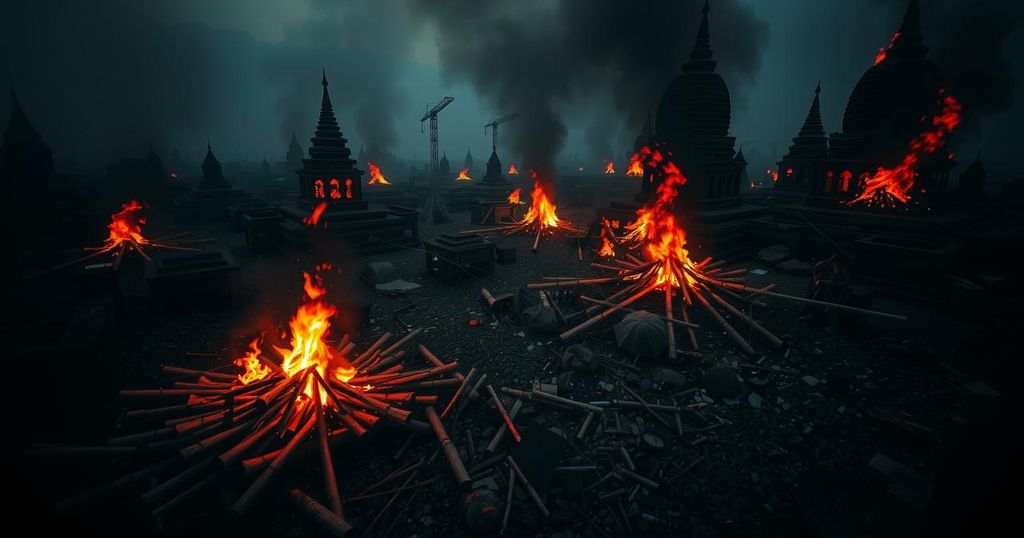Myanmar’s post-coup landscape increasingly reflects a civil war reminiscent of Syria’s, predominantly driven by ethnic conflicts. The military junta’s actions, including crimes against humanity, clash with anti-junta forces committing their own atrocities, complicating the morality of the conflict. The situation is exacerbated by foreign influences, particularly China’s support for the junta, stalling hopes for democratic transitions and regional stability.
The situation in Myanmar today resembles that of Syria, increasingly characterized by civil conflict rather than a struggle for democratization. Nearly four years post-coup, the military junta led by Min Aung Hlaing has faced significant resistance from anti-junta ethnic armed groups, resulting in a deteriorating humanitarian crisis. The military continues to perpetrate grave human rights abuses, while opposition forces engage in violent actions that complicate the moral landscape. With accusations of crimes against humanity surfacing, the combat in Myanmar is no longer a straightforward narrative of good versus evil. Instead, it has devolved into a multifaceted civil war involving not only the Tatmadaw, Myanmar’s military, but various ethnic groups, some of which harbor their own nationalist agendas. Particularly affected are the Rohingya, who endure a historical cycle of oppression and targeted violence. Recent reports highlight that both the military and anti-junta factions are contributing to escalating human rights violations. Observers note that the Arakan Army is perpetrating violence against Rohingya populations while advocating human rights. This dual-pronged persecution illustrates the complex nature of alliances and enmities within the country, raising profound questions about the prospects for an inclusive democracy. The Myanmar military junta’s alliance with China has provided it with a semblance of international legitimacy despite its oppressive regime. As essential supplies become scarce due to the ongoing conflict, many civilians are struggling to procure basic necessities. Efforts for economic development and peace have often been derailed by retaliatory violence and failed governance from the junta and its opposition. While the armed resistance has made territorial gains, it has failed to deliver the peace and stability necessary for genuine progress toward democracy. The intricate interplay of international politics, particularly China’s support for the junta, hampers potential resolutions to the conflict. Furthermore, the apparent apathy or ignorance of other ASEAN nations towards the humanitarian crisis in Myanmar highlights the moral complexities involved. Ultimately, the ongoing turmoil in Myanmar demands an honest reckoning with its historical and contemporary injustices. Until factions can reconcile their differences and acknowledge the plight of all ethnic communities—including the Rohingya—the risk of becoming permanently fractured remains imminent. Finding pathways to mutual recognition and intervention remains crucial for fostering a future that honors the rights of all citizens in Myanmar.
Myanmar has been embroiled in political turmoil since the military coup in February 2021, which toppled the democratically elected government of Aung San Suu Kyi. The ensuing anti-coup protests and armed resistance have spiraled into widespread civil conflict involving various ethnic armies opposing the junta. Historical grievances, particularly against the Rohingya population who have faced systemic violence, complicate the quest for a united front among opposition groups. International responses have also been critical, but the influence of regional powers, particularly China, plays a significant role in shaping the conflict’s trajectory.
The exacerbating violence in Myanmar illustrates a tragic departure from hopes for democracy. Instead of uniting against a tyrannical regime, the factions have fallen into cycles of reciprocal aggression, undermining the ideals of freedom and human rights. The imperative lies in reconciling grievances among diverse ethnic groups and fostering a collective commitment to justice and equality. Without concerted efforts to understand and address the underlying issues of division and distrust, Myanmar risks the fate of becoming an enduring tableau of human suffering.
Original Source: asianews.network






